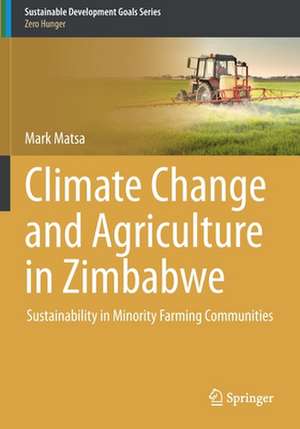Climate Change and Agriculture in Zimbabwe: Sustainability in Minority Farming Communities: Sustainable Development Goals Series
Autor Mark Matsaen Limba Engleză Paperback – 4 sep 2021
The book is meant for college and university students and stakeholders involved in development work in rural minority farmer communities, especially in climate change prone regions of Africa and other developing countries who have very few options of adaptation and mitigation.
| Toate formatele și edițiile | Preț | Express |
|---|---|---|
| Paperback (1) | 632.70 lei 6-8 săpt. | |
| Springer International Publishing – 4 sep 2021 | 632.70 lei 6-8 săpt. | |
| Hardback (1) | 640.24 lei 6-8 săpt. | |
| Springer International Publishing – 4 sep 2020 | 640.24 lei 6-8 săpt. |
Din seria Sustainable Development Goals Series
- 15%
 Preț: 651.51 lei
Preț: 651.51 lei - 18%
 Preț: 1009.70 lei
Preț: 1009.70 lei - 15%
 Preț: 591.79 lei
Preț: 591.79 lei - 18%
 Preț: 952.09 lei
Preț: 952.09 lei - 18%
 Preț: 726.37 lei
Preț: 726.37 lei -
 Preț: 396.40 lei
Preț: 396.40 lei - 18%
 Preț: 1009.70 lei
Preț: 1009.70 lei - 15%
 Preț: 717.45 lei
Preț: 717.45 lei - 15%
 Preț: 704.69 lei
Preț: 704.69 lei - 5%
 Preț: 997.01 lei
Preț: 997.01 lei - 18%
 Preț: 787.15 lei
Preț: 787.15 lei - 18%
 Preț: 727.97 lei
Preț: 727.97 lei - 15%
 Preț: 641.71 lei
Preț: 641.71 lei - 5%
 Preț: 1056.38 lei
Preț: 1056.38 lei - 15%
 Preț: 644.18 lei
Preț: 644.18 lei - 18%
 Preț: 788.72 lei
Preț: 788.72 lei - 18%
 Preț: 736.64 lei
Preț: 736.64 lei - 18%
 Preț: 790.77 lei
Preț: 790.77 lei - 5%
 Preț: 455.95 lei
Preț: 455.95 lei -
 Preț: 172.16 lei
Preț: 172.16 lei - 18%
 Preț: 785.55 lei
Preț: 785.55 lei - 18%
 Preț: 1009.70 lei
Preț: 1009.70 lei - 18%
 Preț: 1143.85 lei
Preț: 1143.85 lei - 18%
 Preț: 1405.09 lei
Preț: 1405.09 lei -
 Preț: 283.04 lei
Preț: 283.04 lei - 15%
 Preț: 637.59 lei
Preț: 637.59 lei - 17%
 Preț: 462.63 lei
Preț: 462.63 lei -
 Preț: 363.86 lei
Preț: 363.86 lei - 18%
 Preț: 1148.61 lei
Preț: 1148.61 lei - 18%
 Preț: 1013.65 lei
Preț: 1013.65 lei - 15%
 Preț: 641.71 lei
Preț: 641.71 lei - 15%
 Preț: 645.79 lei
Preț: 645.79 lei - 18%
 Preț: 1009.70 lei
Preț: 1009.70 lei -
 Preț: 429.61 lei
Preț: 429.61 lei - 18%
 Preț: 959.98 lei
Preț: 959.98 lei -
 Preț: 427.92 lei
Preț: 427.92 lei - 18%
 Preț: 958.38 lei
Preț: 958.38 lei - 5%
 Preț: 402.65 lei
Preț: 402.65 lei - 18%
 Preț: 900.80 lei
Preț: 900.80 lei - 18%
 Preț: 957.32 lei
Preț: 957.32 lei - 15%
 Preț: 646.62 lei
Preț: 646.62 lei - 18%
 Preț: 904.74 lei
Preț: 904.74 lei - 5%
 Preț: 1130.43 lei
Preț: 1130.43 lei - 18%
 Preț: 897.65 lei
Preț: 897.65 lei - 15%
 Preț: 646.62 lei
Preț: 646.62 lei -
 Preț: 436.35 lei
Preț: 436.35 lei - 18%
 Preț: 906.33 lei
Preț: 906.33 lei - 20%
 Preț: 750.61 lei
Preț: 750.61 lei - 18%
 Preț: 737.43 lei
Preț: 737.43 lei
Preț: 632.70 lei
Preț vechi: 744.35 lei
-15% Nou
Puncte Express: 949
Preț estimativ în valută:
121.07€ • 129.46$ • 100.94£
121.07€ • 129.46$ • 100.94£
Carte tipărită la comandă
Livrare economică 17 aprilie-01 mai
Preluare comenzi: 021 569.72.76
Specificații
ISBN-13: 9783030513481
ISBN-10: 3030513483
Ilustrații: X, 98 p. 23 illus., 19 illus. in color.
Dimensiuni: 178 x 254 mm
Greutate: 0.2 kg
Ediția:1st ed. 2021
Editura: Springer International Publishing
Colecția Springer
Seria Sustainable Development Goals Series
Locul publicării:Cham, Switzerland
ISBN-10: 3030513483
Ilustrații: X, 98 p. 23 illus., 19 illus. in color.
Dimensiuni: 178 x 254 mm
Greutate: 0.2 kg
Ediția:1st ed. 2021
Editura: Springer International Publishing
Colecția Springer
Seria Sustainable Development Goals Series
Locul publicării:Cham, Switzerland
Cuprins
Chapter 1. Introduction.- Chapter 2. Climate change and lessons from world indigenous minority farmer communities.- Chapter 3. Climate change and indigenous farmers in Zimbabwe.-
Chapter 4. Rainfall and Temperature fluctuations in South-west Zimbabwe(1922-2012).-
Chapter 5. Climate Change impact on indigenous minority farmer communities in SW Zimbabwe.-
Chapter 6. Interventions on climate climate change among indigenous minority farmer communities in SW Zimbabwe.- Chapter 7. Indigenous minority communities development basket of priorities in SW Zimbabwe.- Chapter 8. ConclusionNotă biografică
Professor Mark Matsa is a Lecturer in the Department of Geography and Environmental Science at Midlands State University, Zimbabwe. His research interests include Waste Management, Climate Change and Sustainable Development, Land cover and land use changes, Water Resources Management, Food Security, Migration, Gender and the Environment, and Biogeography.
Textul de pe ultima copertă
This book proves, through empirical research, that indigenous and traditional agricultural communities have experienced severe climate change impacts, and have developed corresponding livelihood strategies to strengthen their resilience in a variable climate. With a focus on indigenous minority farming communities in the developing region of South-Western Zimbabwe, the study presents both qualitative and quantitative approaches of data analysis to assess sustainability problems amid climate change and climate variability challenges, and proposes potential solutions. In eight chapters, the book expands on the scarce availability of community-based research on climate change and variability in Zimbabwe.
The book is meant for college and university students and stakeholders involved in development work in rural minority farmer communities, especially in climate change prone regions of Africa and other developing countries who have very few options of adaptation and mitigation.
Caracteristici
Demonstrates how traditional agricultural communities have developed strategies to adapt to climate change Focuses on indigenous minority farmer communities in South-Western Zimbabwe Addresses their sustainability problems amid climate variability challenges
